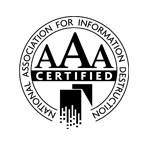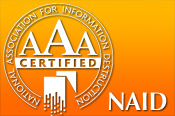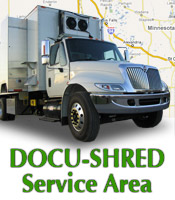Who Must Comply with the Gramm-Leach-Bliley Act:
-Banking and credit issuing
-Insurance
-Stocks, bonds, and investing
-Financial Service Providers
Penalties for Non-Compliance:
Up to $100,000 for each violation.
Criminal penalties may include up to five years in prison.
Security & Compliance
 Docu-Shred Inc is committed to keeping your company's sensitive information safe.
Docu-Shred Inc is committed to keeping your company's sensitive information safe.
We are the only NAID certified document destruction facility in the local area. Our goal is to respect the confidential nature of your records and to maintain appropriate protection to prevent any disclosure of such information.
NAID is the international trade association for companies providing information destruction services. NAID's mission is to promote the information destruction industry and the standards and ethics of its member companies.
Your business may require specific guidelines in compliance with company, state, or federal regulations. We will sit down with you and develop a security plan that is tailored to meeting these areas of compliance.
Whether it be hard drive destruction, bulk shredding, or regularly scheduled visits, we will ensure that your security compliance demands are taken care of to the highest of standards.
Federal Regulations
The Health Insurance Portability and Accountability Act (HIPPA) of 1996
Regulates the healthcare industry in the United States and assures that healthcare organizations will be responsible for the secure electronic transmission, secure storage and disposal of patient information.
The first conviction for a violation of the Health Insurance Portability and Accountability Act (HIPAA) took place the week of November 19, 2004. Richard W. Gibson was ordered to pay $9,000 in restitution and sentenced to 16 months in jail for taking personal information while employed at a cancer treatment center in Seattle, WA. The information was then used to commit identity theft.
Advice: If you handle medical or insurance records, you better have and practice a certified document destruction program or you are risking jail time under HIPAA.
The Gramm-Leach-Bliley Act of 1999 (GLB)
Financial institutions that obtain nonpublic personal information through the normal course of their business must develop precautions to ensure the security and confidentiality of customer records and information, and to protect against unauthorized access to or use of such records. This includes secure storage, disposal, and sharing of confidential information.
The Fair and Accurate Credit Transactions Act of 2003
Also known as the FACT Act was signed into law on December 4, 2003. In general, the Act amends the Fair Credit Reporting Act (``FCRA''). The Act contains a number of provisions intended to combat consumer fraud and related crimes, including identity theft, and to assist its victims. Specifically the act requires the destruction of PAPERS CONTAINING CONSUMER INFORMATION. It is hard to imagine any business or organization that is not bound by this law.
Disposal Rule
Sec. 682.3 Proper Disposal of Consumer Information
Standard. Any person who maintains or otherwise possesses consumer information, or any compilation of consumer information, for a business purpose must properly dispose of such information by taking reasonable measures to protect against unauthorized access to or use of the information in connection with its disposal.
Examples. Reasonable measures to protect against unauthorized access to or use of consumer information in connection with its disposal would include:
Implementing and monitoring compliance with policies and procedures that requires the burning, pulverizing, or shredding of papers containing consumer information so that the information cannot practicably be read or reconstructed.




